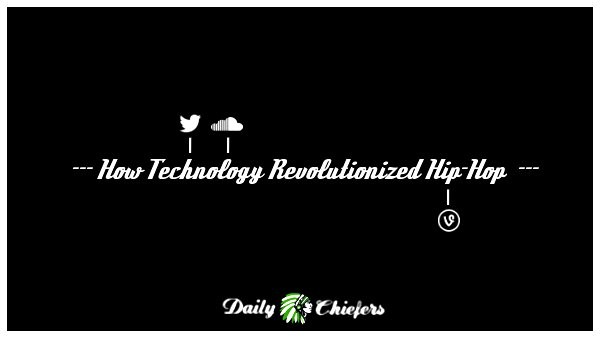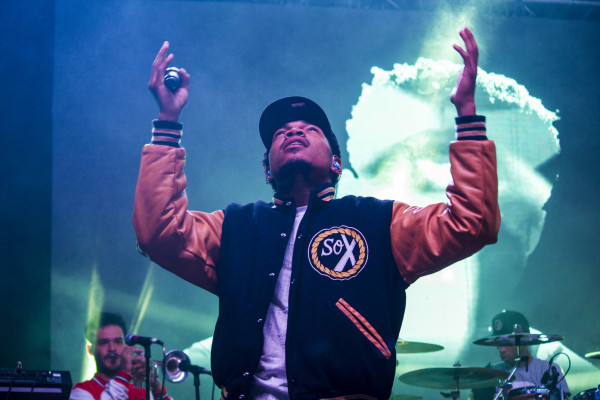Hip-hop music has come a long way. It’s become easier than ever to get heard over the years with the evolution of technology, and now you see artists seemingly blow up overnight. Whether it was a hidden benefactor, killer marketing campaign or they went viral (about a week agoooo), tons of very talented artists are popping up and having success—but that wouldn’t happen if we weren’t where we are technologically.
You no longer have to spend hours at the studio just to send your demo tape to Dr. Dre and hope you hear back; you could just as easily blow up by recording on a usb microphone and uploading your song on various streaming websites like Soundcloud or Spotify.
Soundcloud alone has helped further many artists’ careers thus far, and has revolutionized how musicians and fans share music with the world. It’s made it very easy to connect the fan with the artist directly—as has Twitter. Nowadays you’re not farther than a tweet away from your favorite rapper—hell, even a direct message if they follow you. Obviously they may not respond, but the fact that you can send a personal message directly to them at all is pretty dope.
That all being said, Twitter has become more than a way of communicating with your favorite rapper—it’s become a marketing tool. And no, I don’t mean tweeting to a list of bloggers with the link to your new song with a bunch of fire emojis (please take note, Twitter rappers). I mean taking advantage of a vast and ever-growing audience that is just waiting to be seized.
Just look at the countless artists that have released a single when they had little to no buzz, and now are national headliners. If it weren’t for this viral age of technology, we wouldn’t have “Trap Queen” or maybe even the latest viral hit to hit No. 1 in Desiigner’s “Panda.”
From buzzing Soundcloud single to signing to G.O.O.D. music and appearing on Kanye West’s latest album, all it took was a month. One single month is all it took to go from being a generally unknown artist, to being in the center of Madison Square Garden with Kanye’s arm wrapped around him and millions watching.
If it weren’t for the internet, there’s just no way that word would’ve traveled up the ranks that fast. From Desiigner’s speedy rise to fame to the handful of artists Drake has co-signed-then-collabbed with, the internet has become a mega-catalyst for a lot of these artists’ careers.
It’s more than just the internet though, technology as a whole has birthed a plethora of ways for artists to come up, including apps like Vine.
Take OG Maco for example. You’d be hard-pressed to find a hip hop fan whose ears haven’t been invaded by the words “BITCH, YOU GUESSED IT,” and that is largely because of the popular app. All it takes is a couple of poppin’ Viners to use your song, and the numbers will no doubt explode. Just look at Maco two almost years later—he flipped an ignorantly simple track into a record deal, XXL Freshman cover, international tours and a respected reputation.
Vine has become such a powerful tool that people are now using it as a means to blow up their respective artist with a catchy tune or accompanying dance, no matter how annoying it is. “Whip/Nae Nae” revolutionary Silento is the perfect example of this, as the viral spread of his breakout track was far from organic. This came by way of DanceOn, a Madonna-founded company whose job is to quite literally churn out viral dance tracks.
According to Business Insider, DanceOn paid about 50 of their partnered Vine dancers to share the track and dance on their account, in addition to all the other marketing and PR that was done for the song.
Allowing it to pour into the Vine-osphere like that opened it up to endless more potential fans, allowing the ultra-annoying dance craze to snowball into something much bigger than a song. Athletes were celebrating touchdowns with it, uncoordinated adults were making a fool of themselves, and kids became obsessed with doing their best whip/nae nae impression for anyone who’d watch.
In a way, what DanceOn does is totally cheating, and is unfair to the bushels of promising young talents that are just without the resources to make the proper moves. That being said, Danceon is sadly reflective of today’s media and how it is used to manipulate the people of this country in one way or another, though that’s a whole other story.
While companies like DanceOn use the internet to poison the culture and make money, the good that has been done in hip-hop because of technology far outweigh the bad in my opinion.
To me, one of the most amazing effects of this new age of hip-hop is that it’s put power back into the hands of the artist, making it so you don’t necessarily need a label to have a successful career, or at least have a better shot at pulling a favorable record deal.
Not a lot of people buy albums, and even less buy hard copies; it’s no secret now, streaming has officially taken over. Of course not actually buying the music does hurt the artist, but at the same time it has made merchandise and touring that much more beneficial financially.
Artists like Chance The Rapper, Pouya and more have built incredibly passionate fan bases that I’m sure have them living rather comfortably, though neither of them are signed to any sort of label. They both give their music away for free more often than not, further nurturing and catering to their fan bases, which only entices them to come out to more shows, or spend that money on their newest piece of merchandise. It’s a new game being played in 2016, and I think it’s shifting towards a massively favorable future for artists.
I mean, the fact Chance just made his debut on the Billboard charts is CRAZY. With no label, no radio play, nothing—just purely good music and a good heart behind it. For a lot of artists, the internet has become their label, their way of getting their music out there and on a big enough platform to be stratospherically successful, and I believe that’s what Chance has been fortunate enough to cultivate.
Some people get there through honest work, and paid dues, while others are fortunate enough to cut corners because of companies like DanceOn. Either way, it’s pretty incredible how important the internet and technology has become to music, as it has completely changed the landscape and opened up many doors for rookie and veteran artists alike.
The internet has helped hip-hop pry its way into mainstream culture, and it truly goes a lot deeper than music. At the end of the day, hip-hop has engulfed a generation similar to how rock music took over in the 1980s. You can barely scroll through your chosen news feed without finding something of or relating to hip-hop. It’s evolved from a generally frowned upon genre, to now being the most dominant flavor of music in the world. Hip-hop is clearly so much more than music—it’s a lifestyle. What a time to be alive.





